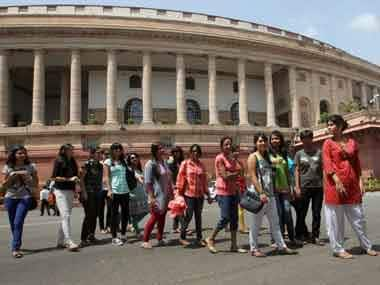Apparently, the UPA believes that its electoral mandate from 2009 permits it to introduce and pass a law in Parliament regardless of whether the bill is properly debated, vetted, amended to perfection and whether it at the very least has the consensus of its own cabinet members. That dissenting cabinet members, and dozens of dissenting parliamentarians from its own fold can be ignored because there is a whip or because the numbers for a vote can be managed. Nothing else explains the smugness of a Union home minister declaring that the bill for the bifurcation of Andhra Pradesh now stands introduced in Parliament.[caption id=“attachment_1389023” align=“alignleft” width=“380”]  Parliament of India. PTI[/caption] The Opposition leader in the Lok Sabha said she did not see or hear the bill being introduced. A leader of the stature of Jaswant Singh said he could not fathom what was happening. Even assuming that Union Home Minister Sushilkumar Shinde spoke the words indicating the introduction of the bill in the House, it can only be in the theatre of the absurd that such a performance of law-making by a government caught in a legislative gridlock of its own making is considered acceptable. Thursday’s melee in the well of Lok Sabha is certainly a new low, but perhaps it was an inevitable new low given the UPA’s track record on debate and discussion, those forgotten hallmarks of parliamentary democracy. Analysis by PRS Legislative Research found that of the 118 bills passed so far by this Lok Sabha, 20 were passed in less than five minutes. Eleven bills were passed after discussions lasting 30 minutes to an hour. Ten other bills were discussed for less than half an hour. Only about 23 percent, or 27 bills, saw more than three hours of discussion. In the past weeks, we have seen the UPA exhibit quite unreservedly that law-making for political expediency is not the exception; it is the norm. Rahul Gandhi’s anti-corruption bills (now discarded), the Lokpal Bill, the unseemly hurry with which the Justice Verma Commission’s recommendations were turned into law – the Congress has made subterfuge a habit while legislating. In fact, the Congress-led UPA has shown complete disregard for Parliamentary process, conventions, the tradition of dialogue across party lines and accommodating, encouraging and comprehending the value of dissent in the process of law-making. The Congress has spent much of its last five years refusing to talk to the Opposition parties and cede some fair ground amid accusations of widespread corruption. Now the BJP, having assured the PM at his dinner table that they support statehood for Telangana provided there is a package for Seemandhra, now say they will not talk to the Congress. The government, its ministers, the MPs from Telangana and Seemandhra must do some navel gazing. The Opposition too. For it is together that they have ensured an all-around loss of faith in politics, and particularly in electoral politics and parliamentary democracy. After Thursday’s incident in Parliament, the BJP is crying conspiracy, expectedly so. No papers were placed before the House, no supplementary agenda was circulated mentioning that the bill would be introduced, said Leader of the Opposition in the Lok Sabha Sushma Swaraj. “We were not against the introduction of the bill, but is this the way to do it?” The BJP is claiming the moral high ground now, but it in fact played its part in disrupting consecutive sessions of Parliament in the last three years with utmost enthusiasm. Its allegation that the ruckus in Lok Sabha on Thursday was stage-managed to engineer a quiet introduction of the Bill and its possible passage under similar circumstances will never be evidenced, but nevertheless, is this the rights based governance that Congress vice president Rahul Gandhi has been promising? The Congress vice-president has himself shown scant respect for parliamentary convention and debate, choosing to skip about half the sessions and speaking just two or three times through a five-year period. Will his speaking for only the six anti-corruption laws he championed condone his utter lack of involvement in Parliament over five years? Voters who send parliamenarians to Lok Sabha expect their representatives to participate fully in law-making. This is no rights-based governance, it is a subversion of every voter’s rights that consecutive sessions of Parliament are a complete washout. And if voters are turning to vigilantes and perpetual protesters, that’s no coincidence either.
The BJP is claiming the moral high ground now, but it in fact played its part in disrupting consecutive sessions of Parliament in the last three years with utmost enthusiasm.
Advertisement
End of Article


)
)
)
)
)
)
)
)
)



